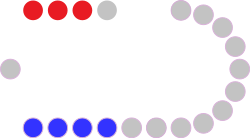Northern Mariana Islands Commonwealth Legislature | |
|---|---|
| 22nd Legislature | |
 | |
| Type | |
| Type | |
| Houses | Senate House of Representatives |
| Leadership | |
| Structure | |
| Seats | 29 voting members
|
 | |
Senate political groups |
|
 | |
House of Representatives political groups |
|
Length of term | Senate 4 years House 2 years |
| Elections | |
Last Senate election | November 8, 2022 (6 seats) |
Last House of Representatives election | November 8, 2022 |
Next Senate election | November 5, 2024 (3 seats) |
Next House of Representatives election | November 5, 2024 |
 |
|---|
The Northern Mariana Islands Commonwealth Legislature is the territorial legislature of the U.S. commonwealth of the Northern Mariana Islands. The legislative branch of the territory is bicameral, consisting of a 20-member lower House of Representatives, and an upper house Senate with nine senators. Representatives serve two-year terms and senators serve four-year terms, both without term limits. The territorial legislature meets in the commonwealth capital of Saipan.
Contents
Similar to the United States Congress, the Senate seats are divided into three districts (three seats each) whose boundaries are identical to those of the municipalities (except that the barely inhabited Northern Islands is incorporated with Saipan). The Constitution provides for the creation of a fourth district for the Northern Islands when the population exceeds 1,000. [1] The Senate seats are divided into two classes, similar to the classes of senators in the United States, with one class consisting of a single senator from each district, and the second class consisting of two senators from each district. In the first election after the ratification of the Constitution, the senator with the third-highest number of votes held their seat for two years. [1] Requirements for senator are a minimum age of 25, residence in the Commonwealth for five years, and a registered voter in the district represented. The Constitution permits a higher residence requirement to be legislated.
The House seats are elected from seven districts. Two districts have one seat each, one for Rota and the other for Tinian and Aguiguan. The remaining five districts elect multiple members, three with two members, and two with six members, and are all located on Saipan, with one also including the Northern Islands. The Constitution provides for the Northern Islands to be a separate district when the population exceeds the number of people represented by any Representative. [1] Reapportionment occurs every 10 years following the census. Requirements for Representative are a minimum age of 21, residence in the Commonwealth for three years, and a registered voter in the district represented. As with the Senate, the Constitution permits the Legislature to enact a higher residence requirement.
The Legislature also has a youth congress, the Commonwealth of the Northern Mariana Islands Youth Congress. [2] [3]
